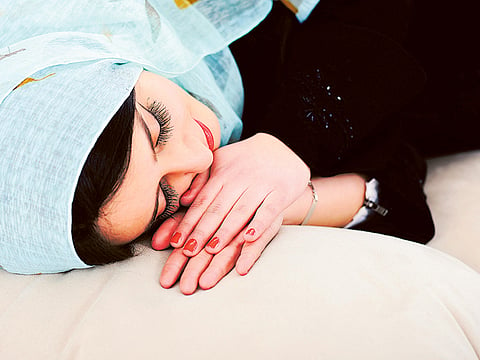Doctors recommend naps in Ramadan
Depending on how active your lifestyle is, find out how much sleep you really need during Ramadan

Dubai: Getting an adequate amount of sleep during the night hours of Ramadan can be a challenging task for many.
Waking up before dusk for suhour in preparation for a 15-hour fast interrupts the regular sleep cycle, leaving many people sleepy and sluggish throughout the day.
One solution to this problem is to make up for the lost sleep by taking short power naps.
Dr Mohammad Rafique, Head of Pulmonology and Sleep Medicine at Prime Hospital, Dubai, told Gulf News while there is no difference in the duration of sleep required during Ramadan, however, compensating for sleep during the day is necessary for a healthy lifestyle during this month.
“Getting a minimum of four and a half to five hours of sleep before suhour time, and a few hours of sleep after suhour is a good sleep pattern for those who fast,” said Dr Rafique.
While this may not be possible for everyone, compensating for sleep by taking 30 minute power naps before iftar could help maintain energy levels for the rest of the day.
Dr Rafique highlighted that observations suggested that there was no change in the quality of sleep during Ramadan, and that a person who got adequate sleep during the fast did not feel sleepy. He noted that what usually prevents people from sleeping at night is excessive indulgence in food or staying out late. This could increase acid reflux into the food pipe, causing heart burn and could even lead to sleep disorders, said Dr Rafique.
In cases where night sleep begins after suhour and lasts for a few short hours, taking power naps in the daytime is recommended.
How much sleep do you need?
However, Dr Babu Shershad of First Medical Centre in Dubai refers to sleep as an individual, tailor-made need.
He said that recommending a fixed number of sleeping hours for all adults is a common misconception.
“Each body requires a specific amount of sleep depending on how active their lifestyle is. Some people need eight hours of sleep, others are perfectly functional with three or four hours of sleep at night,” said Dr Shershad.
A sleep cycle usually consists of several stages. The cycle starts at the initial stages where a person is more easily woken up, and slowly moves into the deep sleep stage known as Rapid Eye Movement (REM). “One’s quality of sleep depends on how long their REM stage is. This is when the body repairs itself, and when dreams happen,” explained Dr Shershad.
Describing it as “the most refreshing type of sleep”, he pointed out that the REM stage is often interrupted during Ramadan, as many wake up for suhour. The result of disturbed sleep could include low levels of energy and concentration, and restlessness throughout the day.
“As Ramadan is only a month long, naps are recommended. The duration of naps needed differ between individuals and depend on the duration of the REM stage the night before,” he said.
While naps may be one of the main sources of energy this month, they should be limited as they could also be causing you to stay up late in the fist place.



